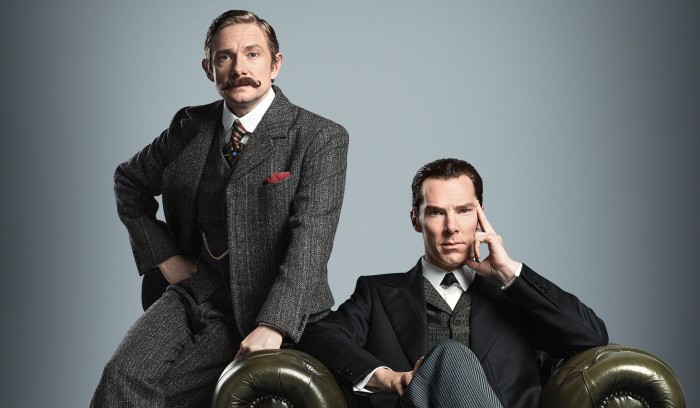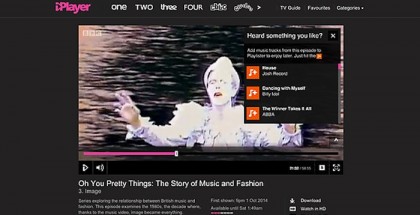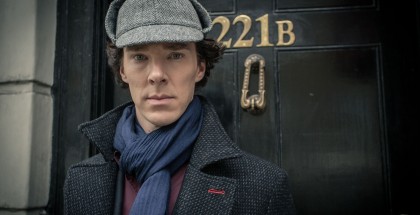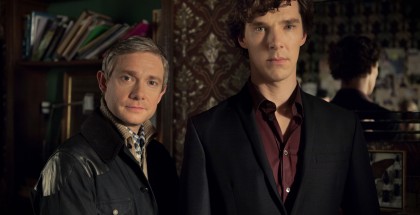Netflix UK TV review: Sherlock: The Abominable Bride (Season 3 Christmas Special)
Review Overview
Timeless cast
8Wibbly-wobbly script
5David Farnor | On 02, Jan 2016
Warning: This review contains minor spoilers, although we have tried to avoid explicit plot details. If you don’t want to know any details about Sherlock’s Christmas special, watch the episode before reading.
Sherlock is back – but not as we know him. Yes, this Christmas special is the much-anticipated old-school outing, which rewinds the clock to 1895. Martin Freeman’s John Watson is now a veteran of the second Afghan war. Benedict Cumberbatch’s Holmes wears a top hat. Some things, though, never change. “Merry Christmas,” he abruptly wishes to Watson and his wife, then stops smiling. “Thank God that’s over.”
How exactly has the Beeb’s modern update wound up in Victorian times? If your theory involved the detective running away with The Doctor for an impromptu holiday in the TARDIS, you wouldn’t be far wrong: this has Steven Moffat’s wibbly-wobbly pen all over it. And, much like Doctor Who’s recent years, that proves to be both a good and a bad thing.
The game, as ever, is afoot, and our duo are faced with a supernatural stumper of a case: a bride (the unnerving Natasha O’Keeffe) shoots herself in public, only to return to life and apparently stalk the streets of London, bumping off victims. A killer from the beyond the grave? It’s surely beyond the logical deductions of literature’s most rational detective.
“Could it be twins?” offers Watson, as they examine the body. “No,” retorts Holmes. “Because it’s never twins.”
And yet this Christmas special does trade in doppelgangers, constructing an elegant string of distorted parallels. And so there are two Holmes and Watsons, as Amanda Abbingdon’s Mary forms her own partnership with Mark Gatiss’ Mycroft; Louise Brealey’s smitten Molly has now become a male version of Hooper, who hates Sherlock; the idea of a vengeful bride is broadly compared to the uprising of women in society; Holmes’ use of hard drugs is positioned as a vague counterpart to his Mind Palace, which was introduced in Season 3 as a way of him using his memory to solve crimes; even Moriarty’s apparent resurrection at the end of Season 3 bears a similarity to this back-from-the-dead mystery.
There are moments of elegance in this web of contrivance, as Moffat and Gatiss’ script dances through its own loopholes. Constants emerge from the opium-like daze it induces, as we see events from Season 1 replayed in period garb. “Come at once, if convenient. If not convenient, come all the same,” demands Sherlock of Watson in a telegram – a line taken straight from the series’ very first episode (A Study in Pink), which originated from a telegram in Arthur Conan Doyle’s books.
The relationships between all of the cast are just as timeless, from Cumberbatch and Freeman attempting an awkwardly intimate chat while staking out a potential victim’s house to Sherlock’s dismissal of the imbecilic Inspector Lestrade (Rupert Graves). The central pair remain electric, able to switch between genuinely funny banter and serious drama in barely a twitch of Watson’s moustache. It’s a pleasure to see all these faces back together and on such fine form, with Una Stubbs’ delightful Mrs. Hudson even poking fun at her usual silence in John Watson’s written accounts of Sherlock’s exploits. “I’m a housekeeper, not a plot device!” she quips, while simultaneously moving the plot along. Heck, the group even manage to squeeze in a commendable discussion about substance abuse, an issue that could easily be treated lightly by the programme.
But while the joyous ensemble makes this Christmas special an undeniable festive treat, the clever-clever nature of the ever-twisting script threatens to throw coal on the cosy log fire: the careful wit holds together the first half brilliantly, but by the time the second half comes around, the intricate turns remove the dramatic tension from the tale. It’s not that the story is hard to follow – one of Sherlock’s strengths is that has always demanded its audience pays attention – but that it’s so thought through in detail that any real sense of suspense takes a leap off the proverbial waterfall of imagination. The odd false step by the well-intentioned screenplay doesn’t help, with one scene seeing Sherlock explain feminism without giving a woman a chance to say anything. Perhaps that’s par for the course for a obnoxious character who’d rather disappear into his own Mind Palace than talk to another human; one thing that you can say about the BBC’s series is that its characterisation of the detective, no matter what year he’s in, has always been consistent. And if this one-off special is essentially a stop-gap to trail the arrival of Season 4 proper in 2017, The Abominable Bride is an entertaining reminder of just how anticipated that run is. It’s hard to believe that it’s been two years since the show’s last season, or that there have only been nine episodes before this one. But over the last five years, even in Sherlock’s weaker cases, it has always left us wanting more. Some things never change.
Sherlock is available on Netflix UK, as part of an £9.99 monthly subscription. It is also available on BritBox, as part of a £5.99 monthly subscription.























